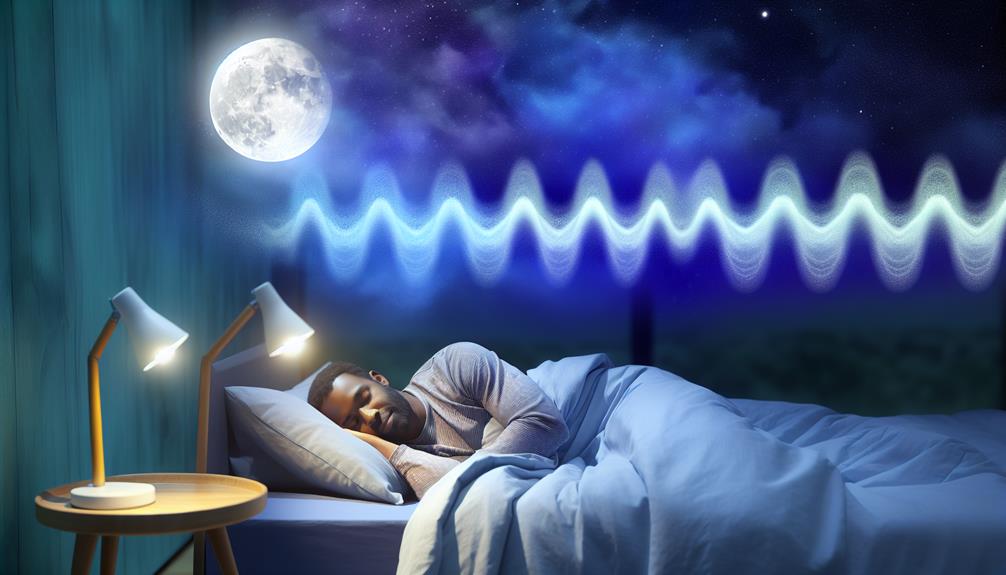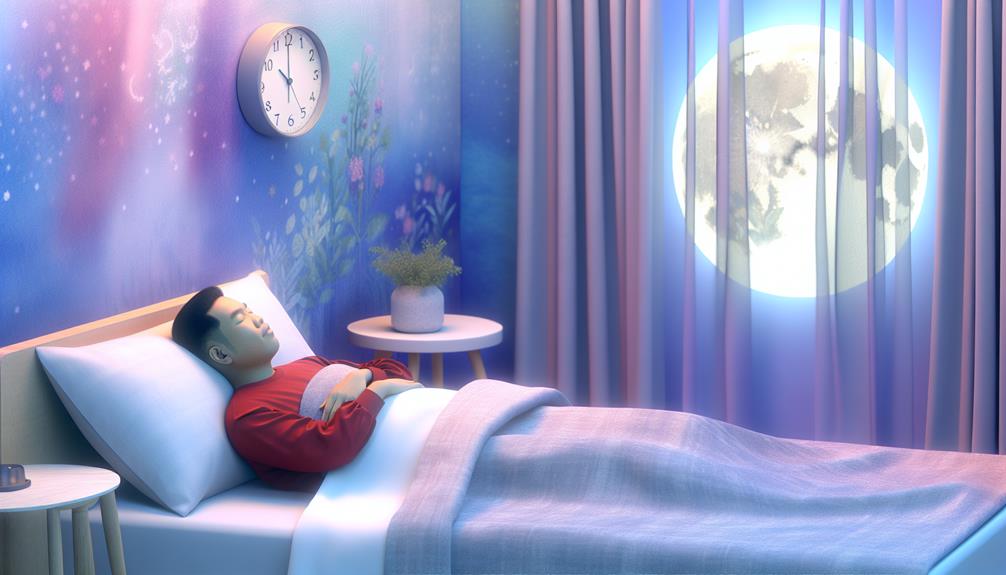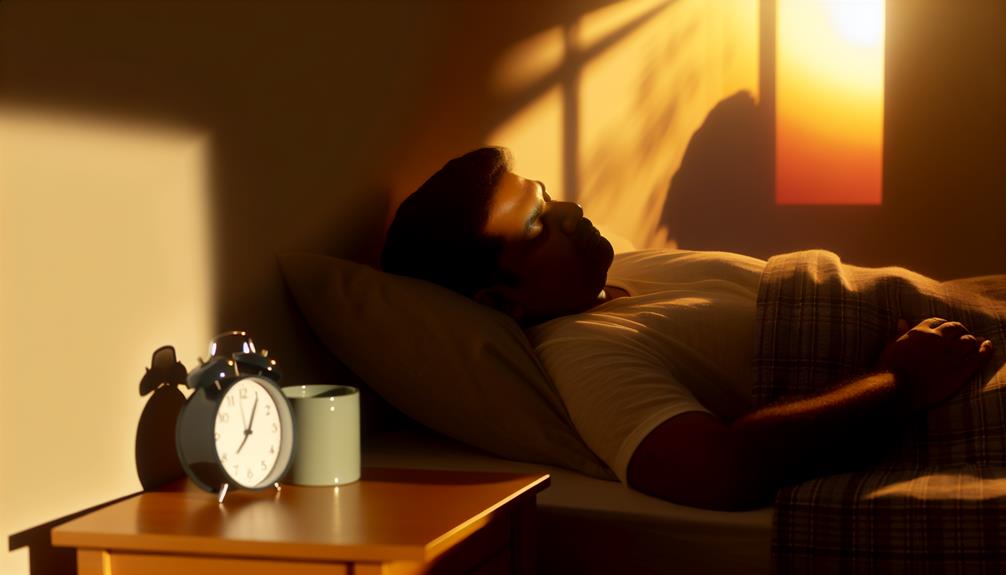I've found that sleep plays an essential role in maintaining men's hormonal balance. It greatly affects testosterone production and cortisol levels, both critical for overall health. During deep sleep, growth hormone peaks, aiding tissue repair, while quality sleep helps stabilize cortisol, the stress hormone. Poor sleep can reduce testosterone levels by up to 15% after just one night, leading to fatigue and mood swings. Consistent sleep patterns enhance hormone regulation and metabolic function. Improving sleep hygiene can amplify these benefits, promoting better emotional and physical health. Keep exploring, and you can discover more about optimizing your sleep for hormonal balance.
Importance of Sleep for Men
Sleep is often overlooked, but it's an essential component of men's health. When I analyze the effects of sleep on overall well-being, I find that sleep deprivation can have significant repercussions. It's not just about feeling tired; the impacts extend to cognitive function, mood stability, and even physical performance. In my research, I've observed that chronic sleep deprivation can lead to decreased sleep quality, which further exacerbates these issues.
Men, in particular, are susceptible to the ramifications of inadequate sleep. The body's recovery processes and metabolic functions are compromised when I don't achieve sufficient rest. I've noted that poor sleep quality disrupts the natural circadian rhythms, leading to an imbalance in various bodily systems. This imbalance can manifest as increased stress levels, weight gain, and a drop in overall liveliness.
Additionally, I find it imperative to understand that the quality of sleep matters just as much as the quantity. A restless night can negate the benefits of hours spent in bed. I've seen firsthand how some men may clock in the recommended hours yet still wake up feeling unrefreshed. This phenomenon often stems from interruptions in the sleep cycle, particularly during REM and deep sleep stages, which are essential for recovery and hormonal regulation.
Hormones Affected by Sleep
During the night, various hormones undergo considerable fluctuations that are essential for maintaining men's health. One of the most important aspects of this process is how sleep cycles influence hormonal balance. The interplay between melatonin secretion and the circadian rhythm establishes a foundation for overall well-being. Hormonal fluctuations orchestrated during sleep are fundamental for the endocrine response, particularly concerning growth hormone, which peaks during deep sleep.
Here are some key hormones affected by sleep:
- Melatonin: Regulates sleep-wake cycles and promotes restorative sleep.
- Growth Hormone: Essential for tissue growth and repair, primarily released during recovery sleep.
- Cortisol: A stress hormone that should ideally decrease during sleep to prevent hormonal imbalance.
- Testosterone: Levels can drop due to sleep disorders, impacting libido and muscle mass.
The importance of REM sleep cannot be overstated, as it plays a role in emotional regulation and cognitive function. Disrupted sleep cycles lead to increased stress and can result in elevated cortisol levels, further compounding hormonal imbalances. Additionally, inadequate recovery sleep can hinder the production of essential hormones, which may leave men more susceptible to health issues.
Understanding the intricate relationship between sleep and hormonal health is fundamental. It's clear that prioritizing quality sleep can considerably influence our hormonal balance, directly impacting overall health and vitality.
Sleep Stages and Hormonal Release

The intricate dance of sleep stages plays a fundamental role in the timing and release of various hormones. As I delve into the nuances of sleep cycles, it becomes clear that each stage—particularly non-REM and REM sleep—contributes uniquely to hormonal fluctuations. During the non-REM stages, especially deep sleep, the body engages in restorative processes, leading to the secretion of growth hormone. This release is essential for tissue repair and muscle growth, which can influence overall hormonal balance.
As we shift into REM sleep, my observations indicate that this stage is particularly significant for emotional regulation and cognitive functions. Curiously, during REM, there's an increase in cortisol levels, a hormone tied to stress response. This is a double-edged sword; while cortisol is important for wakefulness and energy regulation, excessive levels can disrupt other hormonal pathways.
Moreover, the cyclical nature of sleep stages—lasting approximately 90 minutes each—ensures that hormonal release is synchronized with our biological rhythms. I've noted that disruptions in these sleep cycles, such as those caused by sleep disorders or irregular sleep patterns, can lead to imbalances in hormones like insulin and testosterone. As a result, understanding the relationship between sleep stages and hormonal release is essential for maintaining ideal health. Thus, prioritizing quality sleep is not merely a lifestyle choice; it's a fundamental aspect of supporting hormonal equilibrium in men.
Testosterone Production and Sleep
Testosterone production is closely linked to the quality and quantity of sleep a man gets each night. I've observed that inadequate sleep not only leads to fatigue but can also trigger a notable testosterone decline. The relationship between sleep and testosterone is complex, as various sleep stages play crucial roles in hormone synthesis.
When I prioritize sleep quality, I'm not just enhancing my overall health; I'm actively supporting my hormonal balance. Research consistently shows that disruptions in sleep can lead to lower testosterone levels, which can affect numerous aspects of life, from mood to muscle mass. Here's what I've learned about the impact of sleep on testosterone:
- Deep Sleep Stages: These stages are where the most testosterone is produced, so lacking them can affect total hormone levels.
- Sleep Duration: Studies reveal that men who get less than 6 hours of sleep per night are at greater risk for testosterone decline.
- Sleep Disorders: Conditions like sleep apnea can greatly impair sleep quality, resulting in lower testosterone.
- Circadian Rhythms: Maintaining a consistent sleep schedule helps regulate hormonal release, including testosterone.
Cortisol Levels and Sleep Quality

I've observed that sleep duration markedly influences cortisol production, which can affect overall hormonal balance. Stress often disrupts sleep quality, leading to elevated cortisol levels and further complications in hormonal regulation. Additionally, different sleep stages play distinct roles in hormone secretion, making the relationship between sleep and cortisol particularly vital for men's health.
Impact of Sleep Duration
Sleep duration plays a critical role in regulating cortisol levels, which are essential for maintaining hormonal balance in men. I've come to appreciate how insufficient sleep can disrupt my sleep cycles and negatively affect my overall well-being. Research indicates that both sleep quality and duration are intertwined, directly influencing cortisol production.
Here are some key factors that impact sleep duration and cortisol levels:
- Sleep Environment: A dark, quiet, and cool space promotes better sleep quality.
- Sleep Consistency: Sticking to a regular sleep schedule can enhance my sleep routines and overall hormonal balance.
- Sleep Disorders: Conditions like insomnia or sleep apnea can considerably elevate cortisol levels.
- Sleep Technology: Utilizing sleep supplements and tracking devices can help optimize my sleep habits.
Stress and Cortisol Production
Cortisol, often referred to as the stress hormone, plays a pivotal role in the body's response to stress and can greatly affect sleep quality. I've observed that cortisol fluctuations, which can be triggered by daily stressors, considerably influence the ability to fall asleep and stay asleep. When we experience high stress levels, our bodies produce excess cortisol, which can lead to insomnia or disrupted sleep cycles.
In my experience, effective stress management techniques—such as mindfulness, exercise, and proper time management—can help regulate cortisol levels. When I'm proactive about managing stress, I notice a marked improvement in my sleep quality. Lower cortisol levels during the evening allow my body to shift more smoothly into sleep, fostering a deeper, more restorative rest.
Moreover, chronic elevation of cortisol can lead to long-term health issues, including hormonal imbalances. By addressing stress proactively, I find that I not only enhance my sleep quality but also support my overall hormonal balance. Understanding the connection between cortisol production and sleep has reshaped how I approach my daily stressors, ultimately leading to a healthier lifestyle.
Sleep Stages and Hormones
Understanding the intricate relationship between sleep stages and hormonal regulation, particularly cortisol levels, reveals how vital quality sleep is for maintaining hormonal balance. The sleep architecture, consisting of NREM cycles and REM sleep, plays a fundamental role in hormonal fluctuations. During NREM sleep, especially in the deep stages, the body releases growth hormone, which is essential for tissue repair and growth. Conversely, sleep deprivation can lead to elevated cortisol levels, disrupting the endocrine system and affecting overall health.
Here are some key points to reflect on:
- Cortisol levels typically peak in the morning and decline throughout the day, influenced by circadian rhythms.
- REM sleep is essential for emotional regulation and cognitive function, impacting stress hormone levels.
- Sleep deprivation greatly impairs hormonal restoration, leading to chronic health issues.
- Quality sleep enhances the body's ability to manage stress, stabilizing cortisol production.
In this context, achieving ideal sleep quality is not merely a luxury but a necessity for maintaining hormonal balance. By prioritizing restful sleep, we can support our endocrine system and foster overall well-being.
Sleep Deprivation Effects
When we experience sleep deprivation, our bodies undergo a series of hormonal disruptions that can considerably impact our overall health. The immediate sleep deprivation effects often manifest as an increase in cortisol, the stress hormone. Elevated cortisol levels can lead to feelings of anxiety and irritability, which aren't just mental but also have physiological ramifications. Prolonged exposure to high cortisol can foster a state of hormonal imbalance, affecting testosterone levels negatively.
In men, testosterone is essential for various bodily functions, including muscle mass maintenance, libido, and mood regulation. Research indicates that even a single night of poor sleep can reduce testosterone levels by up to 15%. This decline not only affects sexual health but can also lead to fatigue and diminished cognitive performance. I've observed that when sleep becomes irregular, it sets off a cascade of hormonal changes that can result in weight gain, as insulin sensitivity decreases, and appetite-regulating hormones like leptin and ghrelin become disrupted.
Moreover, the interplay between sleep deprivation and hormonal imbalance can create a vicious cycle. As I lose sleep, my body's ability to regulate these hormones deteriorates, leading to further sleep disturbances. It's essential to recognize that addressing sleep deprivation is not merely about improving nightly rest; it's about restoring balance to our bodies' intricate hormonal systems. Understanding these sleep deprivation effects emphasizes the importance of prioritizing sleep to maintain our health and well-being.
Sleep Patterns and Mood Regulation

Sleep deprivation not only disrupts hormonal balance but also greatly affects mood regulation. I've observed that when my sleep cycles are irregular, my emotional stability tends to falter. The interplay between sleep patterns and mood is complex, as disrupted sleep can lead to increased irritability, anxiety, and even depression. It's essential to understand how sleep cycles support emotional wellbeing.
Research indicates that specific sleep stages, particularly REM sleep, play a significant role in processing emotions. When I experience a lack of restorative sleep, I notice a marked decline in my ability to cope with stressors. Here are some insights into how sleep patterns influence mood regulation:
- Increased Stress Hormones: Sleep deprivation can elevate cortisol levels, contributing to heightened stress and anxiety.
- Impaired Emotional Processing: Lack of adequate REM sleep hinders the brain's ability to process emotional experiences, resulting in heightened emotional responses.
- Mood Swings: Irregular sleep patterns can lead to fluctuations in mood, making it challenging to maintain a stable emotional state.
- Cognitive Function Decline: Poor sleep affects cognitive functions such as decision-making and problem-solving, which can further exacerbate mood disturbances.
Impact on Metabolism
The connection between sleep and metabolism is significant, influencing everything from energy levels to weight management. I've explored this intricate relationship and found that the quality and duration of sleep directly affect metabolic regulation. When I don't get enough sleep, my body's ability to regulate hormones like insulin diminishes. This leads to reduced insulin sensitivity, making it harder for my body to manage glucose levels effectively.
Insufficient sleep can create a cascade of hormonal imbalances. For instance, the secretion of leptin, a hormone that signals satiety, decreases, while ghrelin, which stimulates hunger, increases. I've noticed that when I'm sleep-deprived, I'm more prone to cravings and less able to resist high-calorie foods. This imbalance not only affects my immediate energy levels but can also contribute to long-term weight gain and metabolic disorders.
Research shows that chronic sleep deprivation can lead to an increase in body fat and a decrease in lean muscle mass. This is particularly concerning for men, as maintaining muscle mass is vital for overall metabolic health. By prioritizing sleep, I can enhance my insulin sensitivity and improve my metabolic regulation, helping my body process nutrients more efficiently.
Sleep Hygiene Tips

Consistently practicing good sleep hygiene is essential for optimizing hormonal balance and overall health. I've found that by focusing on specific strategies, I can considerably improve my sleep quality, which in turn supports my hormonal regulation. Creating an ideal sleep environment and establishing a consistent bedtime routine are key components of this process.
Here are some effective sleep hygiene tips I recommend:
- Control Light Exposure: Dim the lights an hour before bed to signal your body that it's time to wind down. Avoid screens, as blue light can interfere with melatonin production.
- Maintain a Consistent Schedule: Go to bed and wake up at the same time every day, even on weekends. This consistency reinforces your body's natural circadian rhythm.
- Optimize Your Sleep Environment: Confirm your bedroom is cool, dark, and quiet. Consider using blackout curtains, earplugs, or a white noise machine to enhance your sleep quality.
- Limit Stimulants: Avoid caffeine and nicotine in the hours leading up to bedtime. These substances can disrupt your ability to fall asleep and negatively impact hormone levels.
Role of Naps in Hormonal Balance
Napping can play a significant role in maintaining hormonal balance, especially for men. Research indicates that nap duration and timing are vital factors influencing the effectiveness of daytime naps. For instance, a short power nap of about 20 minutes can enhance alertness and cognitive performance without causing sleep inertia, while restorative naps lasting 60 to 90 minutes can facilitate deeper stages of sleep, potentially aiding in hormonal regulation.
The nap benefits extend beyond mere alertness; they may positively impact testosterone levels, which are essential for men's health. Inadequate sleep can lead to hormonal imbalances, and incorporating regular napping into one's routine might help mitigate some of these adverse effects. Nap frequency also plays a role; individuals who nap regularly may experience improved mood and reduced stress, both of which are critical for maintaining hormonal health.
It's essential to reflect on the nap effects on your overall sleep architecture. For instance, napping too late in the day may disrupt nighttime sleep, thereby negating its benefits. As a result, timing becomes a strategic element in optimizing hormonal balance.
Long-Term Benefits of Quality Sleep

In my analysis, quality sleep markedly enhances testosterone production, which is essential for maintaining male reproductive health. Additionally, it plays an important role in improving stress regulation, thereby mitigating the negative effects of stress on hormone levels. Understanding these long-term benefits can lead to more informed decisions about sleep habits and overall well-being.
Enhanced Testosterone Production
Quality sleep greatly influences testosterone production, a significant hormone for men's overall health and well-being. I've found that the relationship between sleep and testosterone synthesis is complex but fundamental. During sleep, particularly in the REM phase, our bodies undergo important processes that stabilize hormonal fluctuations, directly impacting testosterone levels.
Here are some key points I've noted regarding the long-term benefits of quality sleep on testosterone production:
- Increased testosterone synthesis: Quality sleep can lead to higher testosterone levels, optimizing physical performance and muscle growth.
- Regulation of hormonal fluctuations: A consistent sleep schedule minimizes the peaks and troughs in hormone levels, leading to better long-term hormonal balance.
- Enhanced recovery and repair: Sleep allows the body to recover from physical exertion, which is essential for maintaining testosterone levels.
- Improved mood and mental clarity: Quality sleep positively affects mental health, which can indirectly support testosterone production by reducing stress.
Improved Stress Regulation
Sleep plays an essential role in regulating stress levels, which can have a profound impact on overall hormonal balance. When I prioritize quality sleep, I notice a significant improvement in my stress management capabilities. During sleep, my body undergoes important processes that help mitigate the effects of daily stressors. This restoration is essential for maintaining ideal cortisol levels, the hormone primarily responsible for stress response.
Research indicates that insufficient sleep can lead to heightened cortisol production, which disrupts hormonal equilibrium. By consistently achieving restorative sleep, I enhance my emotional resilience, allowing me to navigate challenges with greater ease. Quality sleep strengthens my ability to manage stress, enabling me to respond rather than react impulsively.
Furthermore, improved stress regulation from adequate sleep contributes to better decision-making and emotional stability. I find that when I'm well-rested, I'm less prone to anxiety and mood swings, both of which can negatively affect hormonal balance. To conclude, the long-term benefits of quality sleep extend beyond mere rest; they play a significant role in stress management and the maintenance of hormonal health, ultimately fostering a more balanced and resilient life.
Frequently Asked Questions
How Does Sleep Affect Men's Fertility and Reproductive Health?
Picture a quiet night, the moonlight casting shadows as I drift into deep sleep. It's during this time that my body rejuvenates, impacting sperm production and testosterone levels. If I skimp on sleep, I notice my energy dips and my reproductive health suffers. Studies show that inadequate rest can lead to lower testosterone, affecting fertility. So, prioritizing those restorative hours isn't just a luxury; it's crucial for maintaining my reproductive health.
Can Sleep Disorders Lead to Hormonal Imbalances in Men?
I've found that sleep disorders like sleep apnea can greatly disrupt hormonal balance in men. Sleep deprivation impacts testosterone levels, leading to hormonal fluctuations that can affect mood and energy. Additionally, irregular circadian rhythms can elevate cortisol production, further complicating hormonal health. It's essential to address any sleep issues to maintain a stable hormonal environment, as the interplay between sleep quality and hormone regulation is complex yet critical for overall well-being.
What Age-Related Hormonal Changes Are Influenced by Sleep Quality?
Did you know that testosterone levels can drop by about 1% per year after age 30? I've found that sleep quality directly impacts this decline. Disrupted sleep cycles can hinder cortisol regulation, exacerbating aging effects. Additionally, poor sleep can reduce growth hormone secretion, which is essential for recovery and muscle maintenance. As stress response increases due to lack of rest, it's clear that sleep plays a significant role in hormonal balance as we age.
How Do Lifestyle Factors Interact With Sleep and Hormonal Balance?
I've found that lifestyle factors greatly impact sleep and hormonal balance. Regular exercise routines promote better sleep quality, while effective stress management techniques mitigate cortisol spikes that disrupt sleep. I've also noticed that reducing alcohol consumption and caffeine intake enhances my rest. Limiting screen time before bed helps me wind down, allowing for deeper sleep. Incorporating relaxation techniques, like meditation, has been essential in maintaining hormonal equilibrium and overall well-being.
Are There Specific Foods That Improve Sleep and Hormone Levels?
Imagine sinking into a cozy bed, the aroma of warm chamomile tea wafting through the air. I've found that sleep-inducing foods, like tart cherries and almonds, can greatly enhance my rest. Pairing these with hormone-boosting snacks such as Greek yogurt or avocado has truly transformed my nights. By nourishing my body with the right ingredients, I've noticed a remarkable improvement in my overall hormonal balance and quality of sleep.
